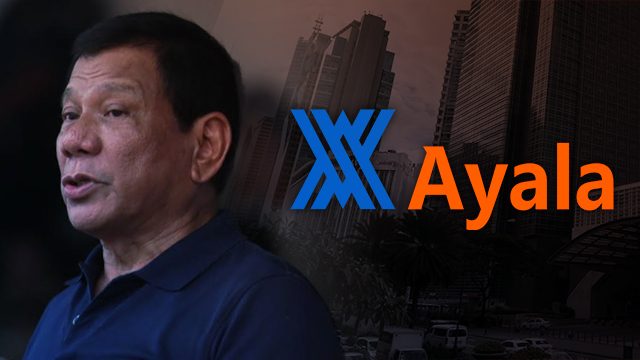SUMMARY
This is AI generated summarization, which may have errors. For context, always refer to the full article.

MANILA, Philippines – The Ayala group, the oldest and among the largest family conglomerates in the Philippines, is betting on the administration of tough-talking President Rodrigo Duterte to provide it continuous room for growth.
The 183-year-old conglomerate has been the most aggressive among the big business groups in the country in allocating capital budget for projects that take years to finish and produce long-term results. During the Aquino administration, their capital expenditures exploded: from only P60 billion in 2010 to P174 billion in 2016.
Now almost one-year under Duterte, the firebrand president whose campaign against drugs, criminals and anti-oligarch sentiments has caused some uncertainties, the Ayala group announced it is continuing its dizzying expansion. It has allocated a group-wide capital expenditure (capex) budget of P185 billion this 2017, its highest to date.
“If you look at the amount of capex that we are looking at for this year, it’s an indication of how bullish we feel about the economy. I think it’s across the group. The results have been good. We’re expanding at a quick rate,” said Ayala Corp Vice-Chairman and COO Fernando Zobel de Ayala at the firm’s annual stockholders meeting on April 21.
Big on infrastructure
The group remains gung-ho in clinching big-ticket infrastructure projects with the Duterte government.
These are investments that require massive capital that will be locked in for decades. Capitalists who view the country as a stable place to invest in are attracted to infrastructure due to these projects’ nature as exclusive contracts. They typically provide fat and stable profits over the long term.
Fernando Zobel explained further: “The only area that we’d like to emphasize that we have to move faster on is infrastructure. We all know how badly needed it is and we know these problems can be solved.”
Their previous infrastructure experience under the Aquino administration has been instructive. “Even the projects that have come online recently have already made a huge difference,” he added.
The Ayala group won the bid for the concession for the 4-kilometer Muntinlupa-Cavite Expressway, the first toll road project awarded under the Aquino’s public-private-partnership (PPP) program. It is also among the consortium members that bagged the Light Rail Transit Line 1 (LRT-1) Cavite Extension PPP project, as well as the group behind the Automatic Fare Collection System. The latter operates under the Beep Card brand used for the country’s railways, select bus lines, toll roads and more.
The economic team of Duterte has recently said this administration will usher in the country’s “golden age of infrastructure.” The Ayala group, together with consortium partners, has already lined up future bids.
“The government listed quite a number of projects and we’re waiting on their decisions on how to roll-out some of them. We already have a consortium for the airport and for the heavy rail,” said Ayala Infrastructure CEO Rene Almendras.
He was referring to the P74.56-billion project to upgrade Ninoy Aquino International Airport. They are also keen on the North-South commuter railway, which is estimated to cost between P250 billion and P260 billion, and will connect Manila all the way to Bicol in the south and Clark, Pampanga in the north.
Initially planned to be auctioned off as a PPP, the railway project, under the Duterte administration, maybe financed through a development assistance from either China or Japan. Ayala group is looking to participate in the project by bidding for the chance to operate and maintain it (O&M project)
“The government has decided to do a government-to-government deal, but they’re talking about possibly doing an O&M deal so we’re engaging the discussion with them on exactly what kind of an O&M project it would be to get a bearing from them on how exactly the private sector can help,” Almendras said.
The group has also tied into the new Duterte administration’s war on drugs by announcing plans to build the first drug rehabilitation center in the Autonomous Region in Muslim Mindanao (ARMM).
Unsolicited projects
With the shift to unsolicited infrastructure projects – a scheme the Aquino administration has shunned due to concerns about corruption – the Ayala group is currently looking at 3 assets.
It previously announced its first unsolicited bid, the C3 elevated expressway (C3Ex), in partnership with the SM group. The tollroad would connect Quezon City with Makati and Bay City in Pasay.

The AC Infra head also said the group was looking at another sizeable possible transport-related infrastructure project in Mindanao and is waiting for government signal to proceed with a feasibility study for it.
“We’re studying a few more unsolicited proposals. We continue to look for places where there is an opportunity to enhance movement, either of goods or of people,” Almendras added.
Almendras, a former Cabiinet member under the Aquino administration, stressed that in participating in unsolicited bids, the Ayala group has “a deliberate strategy in place.”
Ayala Chairman Jaime Augusto Zobel de Ayala explained why they are participating in unsolicited bids for infrastructure: “It’s really an opportunity where the government decides for the development of the country. We believe that will also add a lot of value to the city, to change the traffic management.”
Long-term bets
Under the leadership of the brothers Jaime Augusto and Fernando, the Ayala group has expanded into water business (Manila Water Company), telecommunications (Globe Telecom), healthcare and education, and e-commerce business.
AC Energy, which operates the group’s power business, currently boasts of having assembled power plants with over 1,000 megawatts of attributable power generating capacity in just 5 years. It has set a new target of 2,000 megawatts by 2020, with half accounted by renewable energy projects.
All these capital intensive and long-term bets have been added in the past 3 decades to the group’s legacy businesses, which include property development (Ayala Land) and banking (Bank of the Philippine Islands).
The publicly listed holding firm Ayala Corp reported a 17% increase year-on-year in net income to P26 billion in 2016, buoyed by the economy’s overall 6.9% GDP growth for the year. — Rappler.com
Add a comment
How does this make you feel?
There are no comments yet. Add your comment to start the conversation.